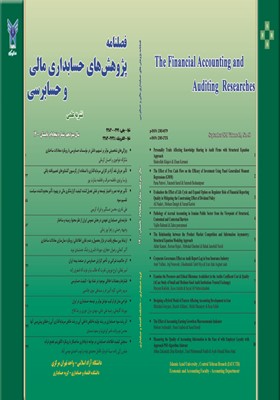طراحی مدل فراترکیب عوامل مؤثربرتوسعه حسابداری در ایران Designing a Hybrid Model of Factors Affecting Accounting Development in Iran
محورهای موضوعی : حسابداری مالی و حسابرسی
مهرداد گلیجانی
1
![]() ,
رضیه علی خانی
2
*
,
مهدی مران جوری
3
,
رضا فلاح
4
,
رضیه علی خانی
2
*
,
مهدی مران جوری
3
,
رضا فلاح
4
1 - گروه حسابداری،واحدچالوس،دانشگاه آزاداسلامی،چالوس،ایران.
2 - گروه حسابداری،واحدچالوس،دانشگاه آزاداسلامی،چالوس،ایران.
3 - گروه حسابداری،واحدچالوس،دانشگاه آزاداسلامی،چالوس،ایران.
4 - گروه حسابداری،واحدچالوس،دانشگاه آزاداسلامی،چالوس،ایران.
کلید واژه: واکاوی, فرا ترکیب, توسعه حسابداری,
چکیده مقاله :
هدف از اجرای این تحقیق شناسایی عوامل مؤثر بر توسعه حسابداری با تکنیک فرا ترکیب از انواع روشهای فرا مطالعه است. در پژوهش حاضر با بکارگیری رویکرد مرور سیستماتیک و فراترکیب کیفی، به تحلیل نتایج و یافتههای محققین قبلی پرداخته و با انجام گامهای هفتگانه روش ساندلوسکی و باروسو، مدل مفهومی عوامل مؤثر بر توسعه حسابداری دستهبندیشده است. بر اساس کدگذاری سه مرحلهای در نرمافزار MAXQDA این عوامل در 4 مقوله اصلی و 30 کد محوری تحلیل و دستهبندی شدند. به منظور سنجش پایایی و کنترل کیفیت مطالعه حاضر از روش کاپا استفاده شد. ضریب کاپا محاسبه شده بهوسیله نرمافزار SPSS برابر با 896/0 بوده که در سطح توافق عالی قرار گرفته است. نتایج نشان دادند عوامل مؤثر بر توسعه حسابداری شامل؛ عامل اقتصادی، عامل محیطی، عامل حرفهای و عامل سازمانی بودند. نتایج این پژوهش میتواند برای متولیان و تصمیم گیران کلان حرفه حسابداری مورد استفاده قرار گیرد.Designing a Hybrid Model of Factors Affecting Accounting Development in IranMehrdad GoleyjaniRazieh AlikhaniMehdi MaranjoryReza FallahReceived: 11/ April /2021 Accepted: 14/ June /2021AbstractThe purpose of this research is to identify the factors influencing the development of accounting by the combination of meta-analysis techniques. In the present study, by applying a systematic and qualitative cross-over approach, we analyze the results and findings of previous researchers and by conceptualizing the seven factors of Sandelowski and Barroso method, the conceptual model of factors influencing accounting development is categorized. Based on three-stage coding in MAXQDA software, these factors were analyzed and categorized into 4 main categories and 30 axial codes. Kappa method was used to evaluate the reliability and quality control of the present study. The kappa coefficient calculated by SPSS software was 0.896 which is in good agreement. The results showed that the factors affecting the development of accounting included economic factor, environmental factor, professional factor and organizational factor. The results of this study can be used for accounting and macro decision makers.Keywords: Accounting Development, Analysis, Cross-Compounding.
The purpose of this research is to identify the factors influencing the development of accounting by the combination of meta-analysis techniques. In the present study, by applying a systematic and qualitative cross-over approach, we analyze the results and findings of previous researchers and by conceptualizing the seven factors of Sandelowski and Barroso method, the conceptual model of factors influencing accounting development is categorized. Based on three-stage coding in MAXQDA software, these factors were analyzed and categorized into 4 main categories and 30 axial codes. Kappa method was used to evaluate the reliability and quality control of the present study. The kappa coefficient calculated by SPSS software was 0.896 which is in good agreement. The results showed that the factors affecting the development of accounting included economic factor, environmental factor, professional factor and organizational factor. The results of this study can be used for accounting and macro decision makers.
یادداشتها
_||_

